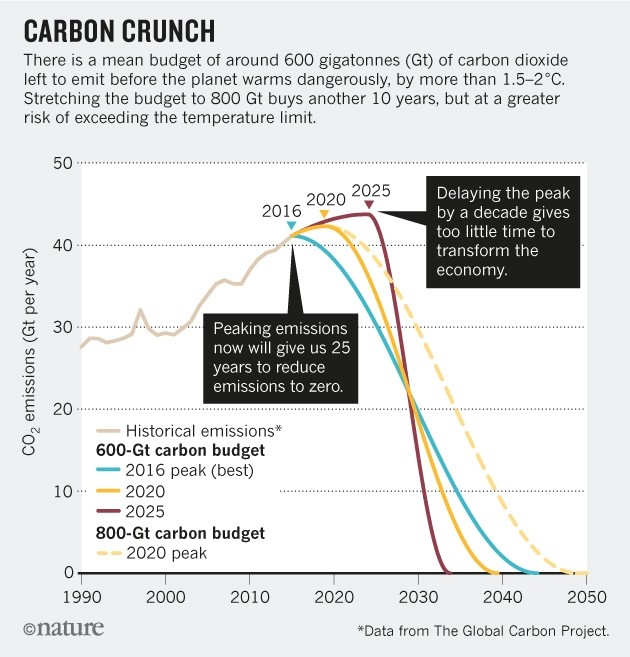
The world has three years to prevent catastrophic climate change, according to a group of experts convened by former UNFCCC chairwoman Christiana Figueres. In a comment published yesterday in Nature, Figueres, along with five co-authors and more than 60 co-signatories, identified immediate measures to enact by 2020 in six key sectors to have a reasonable chance to safeguard the global climate. Data-Driven Yale director, Dr. Angel Hsu, and researchers, Amy Weinfurter and Carlin Rosengarten, contributed to research underpinning the campaign’s inception report, “Mission 2020: The Climate Turning Point,” and Dr. Hsu is a cosignatory of the group’s Nature comment.
Synthesizing current science, Mission 2020’s thesis is that the world has three years to begin drawing down anthropogenic carbon emissions to keep warming below the 2-degree threshold. If we do not peak emissions by 2020 and begin a rapid drawdown, the world will exceed its carbon budget and lock in catastrophic climate change, so we must act with the utmost urgency (See Figure).
With support from scores of experts, including Data-Driven Yale researchers, Mission 2020 establishes science-based targets for six key sectors – Energy, Infrastructure, Transport, Land, Industry, and Finance – that, if met, would bend the global emissions curve downward on a path consistent with 2-degree scenarios. The targets are ambitious – 30% renewable electricity by 2020, for instance – yet these goals must be achieved if human civilization is to stave off disastrous climate change.

Central to Mission 2020’s message is the argument that meeting these goals and, indeed, decarbonizing society is necessary, achievable, and desirable. Climate change science shows plainly why cutting emissions now is necessary. New research depicting the incipient revolutions in energy production and transportation shows that realizing drastic emissions cuts is achievable with supportive policies.
Recent studies also make a compelling case for emissions reductions’ desirability – that the same actions that reduce global emissions also improve human health and welfare. Mission 2020’s task is to convince the world’s political, civic, and business leaders of the campaign’s central tenants: the world needs to cut emissions now to avoid catastrophic climate change; the necessary reductions are within our ability to achieve; and taking these actions will make human civilization healthier, wealthier, and happier. With G-20 leaders set to meet next week in Bonn, Germany, Mission 2020’s call to action from these countries, responsible for nearly three-fourths of the world’s greenhouse gas emissions, marks a crucial moment in climate diplomacy.

Recent Comments